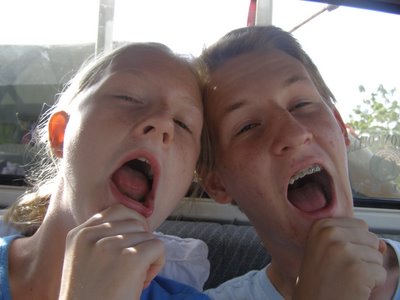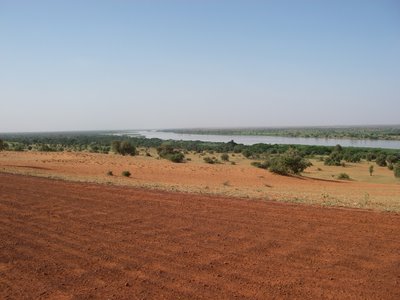 e river to a paved road on the left bank which runs directly into Niamey. That's the easy way. Along the way you often see scenes like the one at the left. Note that the stuff on top of the van is higher than the van itself. Is this van top heavy or what? Maybe we should try this with airplanes. We could carry a lot more luggage.
e river to a paved road on the left bank which runs directly into Niamey. That's the easy way. Along the way you often see scenes like the one at the left. Note that the stuff on top of the van is higher than the van itself. Is this van top heavy or what? Maybe we should try this with airplanes. We could carry a lot more luggage.The other way to Niamey starts out the same. You take the paved road from Tera to the Niger River, but instead of taking the ferry across to the left bank, you turn off onto a dusty, unpaved road on the right bank which parallels the river. We affectionately call it "the back road." Only real missionaries take the back road. It is a bone-jarring, teeth-chattering, head bashing rocking and rolling ride. The road has moon-sized craters, hard washboard abs to die for, sand dunes in the most unexpected places, road hazards like cows and people and thorns, bushes along either side which totaly obscure the view, choking dust, and pebbles which when thrown up by passing cars can smash you windshield to smithereens. Also, the road has huge potholes which can swallow your car whole. Be on the alert. Here is a picture of the road.

So when we turned onto the back road on Sunday, Ocotber 15 on our way to Niamey, I told the kids to hold onto their chins because they were going to get jerked around. They were.

One nice thing about the back road is the scenery. At one point, the road tops out on a sand dune high above the river, and a beautiful panorama unfolds. The whole valley of the Niger is spread out at your feet. This picture does not do it justice.
After our stop for pictures on the dune , Daniel decided to try his skills as a hood ornament. He didn't fare too well.
After 60 km and nearly one hour of bumping, rolling, and jerking, you finally reach the end of the road, but not without one final obstacle: a washed-out bridge. You have to cross about 300 meters of deep sand which is the bed of a seasonal river. Only occasionally do you see water in it. With our four wheel drive truck we have no trouble crossing, but more than once we have seen cars stuck in the sand.
What a relief to get to the smooth, paved road coming from neighboring Burkina Faso and heading into Niamey! Then all we have to do is cross the bridge in Niamey (the only bridge on the river between Nigeria and Bamako, the capital of Mali) to get to our destination. On Sunday, Ocotober 15, we made it in one piece, only slightly the worse for wear.
The next morning we woke up to find a thorn in one of our tires. Yes, it was flat! That's life in Niger.
